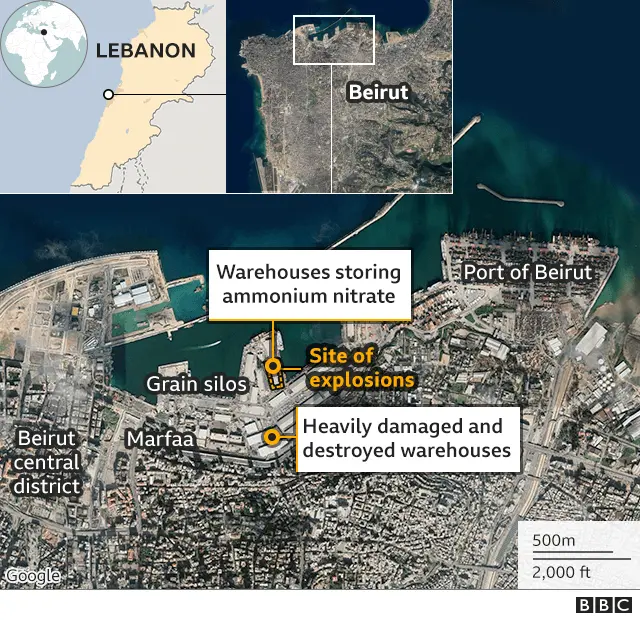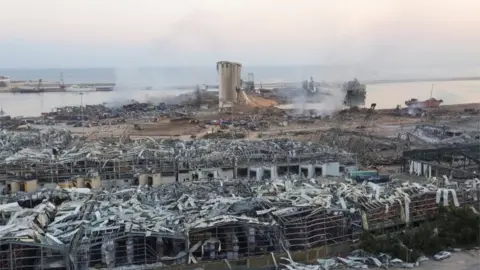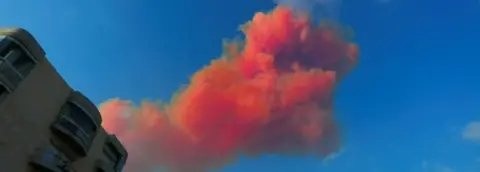Beirut explosion: Frantic search for survivors of deadly blast
Rescue workers in Lebanon are searching for dozens of people missing a day after a huge explosion devastated the port area of the capital, Beirut.
The blast, which shook the whole city, killed at least 113 people and injured more than 4,000 others. A two-week state of emergency has been declared.
President Michel Aoun said the blast was caused by 2,750 tonnes of ammonium nitrate stored unsafely in a warehouse.
All port officials have been put under house arrest pending an investigation.
Customs chief Badri Daher told local media that his agency had repeatedly called for the ammonium nitrate to be removed, but "this did not happen, and we leave it to the experts to determine the reasons".
Ammonium nitrate is used as a fertiliser in agriculture and as an explosive.
Opening an emergency cabinet meeting, President Aoun said: "No words can describe the horror that has hit Beirut last night, turning it into a disaster-stricken city".
The explosion occurred just after 18:00 (15:00 GMT) after a fire at the port, and it was felt 240km (150 miles) away on the island of Cyprus, in the eastern Mediterranean.
What is the latest on rescue efforts?
Security forces have sealed off a wide area around the blast site, and rescuers have been looking for bodies and survivors under rubble while boats searched the waters off the coast.
However the overnight rescue effort was hampered by a lack of electricity.
Public Health Minister Hamad Hassan said Lebanon's health sector was short of beds and lacked the equipment necessary to treat the injured and care for patients in critical condition.
He said a "large number of children" had been rescued but added that he feared that the number of dead would rise further.
The Saint Georges hospital near the site of the explosion was badly damaged and several members of staff were killed. Three Beirut hospitals were closed with two others only partially operational, the World Health Organization (WHO) said. The body said it would airlift medical supplies to Lebanon on Wednesday evening.
Three French planes are due to arrive carrying 55 rescuers, medical equipment and a mobile clinic equipped to treat 500 people. French President Emmanuel Macron will visit on Thursday. The EU is sending 100 firefighters with vehicles, dogs and equipment. Russia is sending five planes carrying rescuers, doctors and equipment.
Meanwhile, many buildings and homes have been reduced to an uninhabitable mess of glass and as many as 300,000 people have been left homeless, Beirut's governor Marwan Aboud said.
What triggered the explosion?
The ammonium nitrate had reportedly been in a warehouse in Beirut port for six years after it was unloaded from a ship impounded at the port in 2013.
The head of Beirut port and the head of the customs authority both told local media that they had written to the judiciary several times asking that the chemical be exported or sold on to ensure port safety.
The port's General Manager Hassan Koraytem told OTV that they had been aware that the material was dangerous when a court first ordered it stored in the warehouse, "but not to this degree".


Lebanon's Supreme Defence Council has vowed that those found responsible will face the "maximum punishment" possible.
Economy Minister Raoul Nehme told the BBC: "I think it is incompetence and really bad management and there are a lot of responsibilities from management and probably previous governments. We do not intend after such an explosion to stay silent on who is responsible for what."
British former intelligence officer Philip Ingram told the BBC's Today programme that ammonium nitrate could only be turned into an explosive substance under certain circumstances.
Mr Ingram said that safely stored it was relatively safe but that in confined space and when contaminated with items such as fuel oil it could cause an explosion.
 Reuters
ReutersThe ammonium nitrate arrived on a Moldovan-flagged ship, the Rhosus, which entered Beirut port after suffering technical problems during its voyage from Georgia to Mozambique, according to Shiparrested.com, which deals with shipping-related legal cases.
The Rhosus was inspected, banned from leaving and was shortly afterwards abandoned by its owners, sparking several legal claims. Its cargo was then removed and stored in a port warehouse for safety reasons, the report said.

Ammonium nitrate
 Reuters
Reuters- Common industrial chemical used mainly as fertiliser in agriculture
- Also one of the main components in explosives used in mining
- Not explosive on its own, ignites only under the right circumstances
- When it explodes, it can release toxic gases including nitrogen oxides and ammonia gas
- Strict rules on how to store it safely: site has to be fire-proofed, and not have any drains, pipes or other channels in which ammonium nitrate could build up

What's the background?
The explosion comes at a sensitive time for Lebanon. With Covid-19 infections on the rise, hospitals were already struggling to cope. Now, they are faced with treating thousands of injured people.
The country is also going through the worst economic crisis since the 1975-1990 civil war, and tensions were already high with street demonstrations against the government.
Many blame the ruling elite who have dominated politics for years and amassed their own wealth while failing to carry out the sweeping reforms necessary to solve the country's problems. People have to deal with daily power cuts, a lack of safe drinking water and limited public healthcare.
Lebanon imports most of its food and large quantities of grain stored in the port have been destroyed causing fears of widespread food insecurity to come. The future of the port itself is in doubt due to the destruction caused.
President Aoun announced that the government would release 100 billion lira (£50.5m; $66m) of emergency funds but the impact of the blast on the economy is expected to be long-lasting.
The explosion happened close to the scene of a huge car bombing which killed former Prime Minister Rafik Hariri in 2005. A verdict is due in the trial of four men accused of orchestrating the attack on Mr Hariri at a special court in the Netherlands.

Have you been personally affected by this story? If you feel able to do so please share your experiences by emailing [email protected].
Please include a contact number if you are willing to speak to a BBC journalist.
- WhatsApp: +44 7756 165803
- Tweet: @BBC_HaveYourSay
- Send pictures/video to [email protected]
- Upload your pictures / video here
- Please read our terms & conditions and privacy policy
